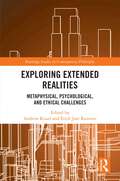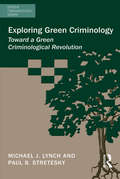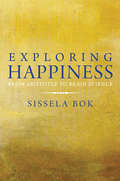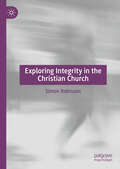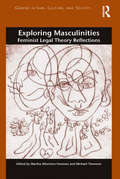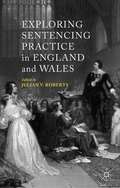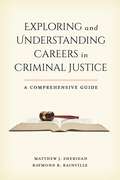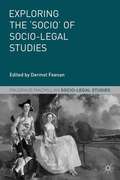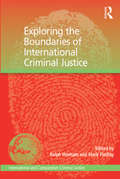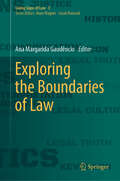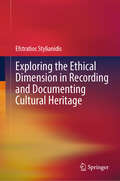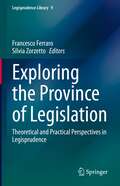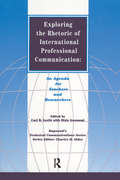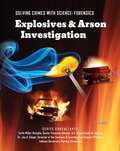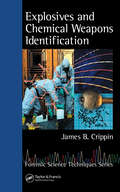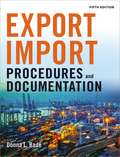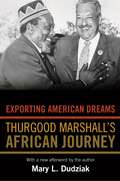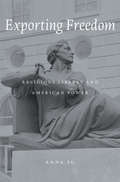- Table View
- List View
Exploring Ethics: An Introductory Anthology
by Steven M. CahnIn this remarkably accessible, concise, and engaging introduction to moral philosophy, Steven M. Cahn brings together a rich, balanced, and wide-ranging collection of fifty-two readings on ethical theory and contemporary moral issues. He has carefully edited all the articles to ensure that they will be exceptionally clear and understandable to undergraduate students. The selections are organized into three parts--Challenges to Morality, Moral Theories, and Moral Problems--providing instructors with flexibility in designing and teaching a variety of ethics courses. Each reading is followed by study questions.
Exploring Extended Realities: Metaphysical, Psychological, and Ethical Challenges (Routledge Studies in Contemporary Philosophy)
by Andrew Kissel Erick José RamirezThis volume highlights interdisciplinary research on the ethical, metaphysical, and experimental dimensions of extended reality technologies, including virtual and augmented realities. It explores themes connected to the nature of virtual objects, the value of virtual experiences and relationships, experimental ethics, moral psychology in the metaverse, and game/simulation design. Extended Reality (XR) refers to a family of technologies aiming to augment (AR) or virtually replace (VR) human experience. The chapters in this volume represent cutting-edge research on XR experiences from a wide range of approaches including philosophy, psychology, Africana studies, and the cognitive sciences. They are organized around three guiding questions. Part 1, "What is Extended Reality?", contains a series of chapters examining metaphysical questions about virtual objects, actions, and worlds. Part 2, "Is There an Ethics for Extended Realities?", includes chapters that address ethical questions that arise within XR experiences. Finally, Part 3, "What Can We Do with Extended Realities?", features chapters from a diverse group of social scientists on the potential uses of XR as an investigative and educational tool, including its strengths and pitfalls. Exploring Extended Realities will appeal to scholars and advanced students working in philosophy of technology, metaphysics, moral psychology, applied ethics, and game studies.
Exploring Green Criminology: Toward a Green Criminological Revolution (Green Criminology)
by Michael J. Lynch Paul B. StreteskyFew criminologists have drawn attention to the fact that widespread and significant forms of harm such as green or environmental crimes are neglected by criminology. Others have suggested that green crimes present the most important challenge to criminology as a discipline. This book argues that criminology needs to take green harms more seriously and to be revolutionized so that it forms part of the solution to the large environmental problems currently faced across the world. It asks how criminology should be redesigned to consider green/environmental harm as a key area of study in an era where destruction of the earth and the world’s ecosystem is a major concern and examines why this has remained unaccomplished so far. The chapters in this book apply an environmental frame of reference underlying a green approach to issues which can be addressed from within criminology and which can encourage criminologists and environmentalists to respond and react differently to environmental crime.
Exploring Happiness: From Aristotle to Brain Science
by Sissela BokFrom the acclaimed author of Lying, a brilliant exploration of happiness set in the context of the world’s great philosophers, leaders, writers, and artists In this smart and timely book, the distinguished moral philosopher Sissela Bok ponders the nature of happiness and its place in philosophical thinking and writing throughout the ages. With nuance and elegance, Bok explores notions of happiness—from Greek philosophers to Desmond Tutu, Charles Darwin, Iris Murdoch, and the Dalai Lama—as well as the latest theories advanced by psychologists, economists, geneticists, and neuroscientists. Eschewing abstract theorizing, Bok weaves in a wealth of firsthand observations about happiness from ordinary people as well as renowned figures. This may well be the most complete picture of happiness yet.This book is also a clarion call to think clearly and sensitively about happiness. Bringing together very different disciplines provides Bok with a unique opportunity to consider the role of happiness in wider questions of how we should lead our lives and treat one another—concerns that don’t often figure in today’s happiness equation. How should we pursue, weigh, value, or limit our own happiness, or that of others, now and in the future? Compelling and perceptive, Exploring Happiness shines a welcome new light on the heart of the human condition.
Exploring Integrity in the Christian Church
by Simon RobinsonThis book presents a philosophical and theological analysis of the concept of integrity. Using case studies, it offers a view of integrity which is focused in: identity (individual and corporate); responsibility (for critical reflection on identity and related ideas and feelings associated with worth, mutual and plural accountability, and shared responsibility for creating and creation); ongoing learning (individual and corporate). Simon Robinson brings together Aristotelian and existentialist perspectives, agapeic theology, and wider leadership and governance theory, and in doing so connects ecclesiology, Christian Ethics, pastoral theology, church leadership and governance. Robinson focuses on praxis, reflection on how the Christian church engages its members and the world, and how it can learn and develop peacebuilding. Critical to this the development of genuine dialogue, individual and shared narrative building, and the corporate framework of virtues and virtue development, which connects individual and corporate agency.
Exploring Masculinities: Feminist Legal Theory Reflections (Gender in Law, Culture, and Society)
by Michael Thomson Martha Albertson FinemanWhile masculinities theory has had much to say on relationships of subordination, few feminist legal scholars have examined the implications of masculinities theory for feminist legal theory. This volume investigates the ways in which emerging masculinities theory in law could inform feminist legal theory in particular and law in general. As many of the chapters in this collection illustrate, law is constantly in a dynamic interaction with masculinities: it has both influenced existing masculinities and has been influenced by those masculinities. The contributions focus feminist and critical theoretical attention on masculinities and consider the implications of masculinities theory for law and legal theory. The book sets out the theoretical trajectory of masculinities studies as a field and its application in law and uses insights from a masculinities approach to study socio-political construction of gender identities in specific settings. It also explores how understanding historical construction of gender identities can inform more effective public policy and activism. Written by leading experts in the area, the book poses important questions about the development of the relationship between feminisms and masculinities theory and will be essential reading for those working in law and gender and related areas.
Exploring Moral Injury in Sacred Texts
by John Thompson Warren Carter Rita Nakashima Brock Amir Hussain Brad Kelle Daniel C. Maguire David R. Blumenthal Joseph Mcdonald Kelly Denton-Borhaug Michael Yandell Nancy BowenMoral injury is a profound violation of a human being's core moral identity through experiences of violence or trauma. This is the first book in which scholars from different faith and academic backgrounds consider the concept of moral injury not merely from a pastoral or philosophical point of view but through critical engagement with the sacred texts of Judaism, Christianity, Islam, Buddhism and American Civil Religion. This collection of essays explores the ambiguities of personal culpability among both perpetrators and victims of violence and the suffering involved in accepting personal agency in trauma. Contributors provide fresh and compelling readings of texts from different faith traditions and use their findings to reflect on real-life strategies for recovery from violations of core moral beliefs and their consequences such as shame, depression and addiction. With interpretations of the sacred texts, contributors reflect on the concerns of the morally-injured today and offer particular aspects of healing from their communities as support, making this a groundbreaking contribution to the study of moral injury and trauma.
Exploring Postcolonial Biblical Criticism: History, Method, Practice
by R. S. SugirtharajahExploring Postcolonial Biblical Criticism: History, Method, Practice offers a concise and multifaceted overview of the origins, development, and application of postcolonial criticism to biblical studies.? Offers a concise and accessible introduction to postcolonial biblical studies Provides a comprehensive overview of postcolonial studies by one of the field's most prominent figures Explains one of the most innovative and important developments in modern biblical studies Accessible enough to appeal to general readers interested in religion
Exploring Private Law
by Elise Bant Matthew HardingInspired by recent debate, the purpose of this collection of essays on private law doctrines, remedies, and methods is to celebrate and illustrate the contribution that both 'top-down' and 'bottom-up' methods of reasoning make to the development of private law. The contributors explore a variety of topical subjects, including judicial approaches to 'top-down' and 'bottom-up' methods; teaching trusts law; the protection of privacy in private law; the development of the law of unjust enrichment; the private law consequences of theft; equity's jurisdiction to relieve against forfeiture; the nature of fiduciary relationships and obligations; the duties of trustees; compensation and disgorgement remedies; partial rescission; the role of unconscionability in proprietary estoppel; and the nature of registered title to land.
Exploring Sentencing Practice in England and Wales
by Julian V. RobertsThis volume explores the theory and practice of sentencing in England and Wales, exploring issues such as the role of previous convictions, offender remorse and sentencing female offenders, as well as drawing upon a new and unique source of data from the Crown courts.
Exploring and Understanding Careers in Criminal Justice: A Comprehensive Guide
by Matthew J. Sheridan Raymond R. RainvilleCriminal justice careers typically fall into one of two categories: law enforcement or legal. But contrary to what many may know about the career opportunities in criminal justice, it is more than just becoming a cop or a lawyer. In Exploring and Understanding Careers and Opportunities in Criminal Justice, Matthew J. Sheridan and Raymond R. Rainville provide a practical, comprehensive guide that easily explains the extensive operations and the scope of employment possibilities and opportunities in the criminal justice profession. They cover many criminal justice functions and career paths that are seldom discussed when preparing for a career in criminal justice. Rainville and Sheridan focus on how to obtain employment in a career field that fits personal strengths and aspirations and emphasize the value of internships and service learning as tools to obtain the desired position. A career in criminal justice is a process of many potential outcomes. The career professional who plans, continues personal development, and prepares their career path will discover many potential rewards that include satisfaction during and after their career. The field of criminal justice will continue to expand and grow. Legislative mandates will promote new policies and employment opportunities to keep pace with changes and improvements in criminal justice practices to meet needs that enable the career professional to protect and serve. As the title suggests, anyone interested in exploring and understanding the field of criminal justice and the opportunities it can provide needs to read this book. Sheridan and Rainville make it known that there are more options in the field of criminal justice than you thought, and that the process for obtaining employment and developing the career path you desire most can be done!
Exploring the 'Socio' of Socio-Legal Studies
by Dermot FeenanIn this insightful collection, a broad range of scholars analyzes a core issue for socio-legal studies, what is understood by the 'socio' of the 'socio-legal'. Drawing from legal theory, cultural studies, and social policy, the collection's wide scope of themes and topics provides an important stock-take and analysis of the socio-legal field.
Exploring the Boundaries of International Criminal Justice: Strategies For Achieving Justice In Post-conflict Societies (International And Comparative Criminal Justice Ser.)
by Mark FindlayThis collection discusses appropriate methodologies for comparative research and applies this to the issue of trial transformation in the context of achieving justice in post-conflict societies. In developing arguments in relation to these problems, the authors use international sentencing and the question of victims' interests and expectations as a focus. The conclusions reached are wide-ranging and haighly significant in challenging existing conceptions for appreciating and giving effect to the justice demands of victims of war and social conflict. The themes developed demonstrate clearly how comparative contextual analysis facilitates our understanding of the legal and social contexts of international punishment and how this understanding can provide the basis for expanding the role of restorative international criminal justice within the context of international criminal trials.
Exploring the Boundaries of Law (Living Signs of Law #3)
by Ana Margarida GaudêncioThis book presents a pluri-dimensional approach to today's most relevant perspectives on the boundaries of Law, both in terms of its creation and performance, in order to discuss its current meaning and role as a normative order. To do so, it presents a broad range of standpoints concerning philosophical, theoretical, juridical-political, dogmatic and methodological issues, and proposes new bases for the construction and effectiveness of legal statements and decisions, from those issued by juridical-political organisations to those taken by judges. In addition, it sheds new light on discussions concerning the juridical and political role of Law in connection with public policy and democracy-related issues, especially contemporary debates between International Law and Human Rights Law, on the one hand, and between Public Law and Private Law, on the other.
Exploring the Ethical Dimension in Recording and Documenting Cultural Heritage
by Efstratios StylianidisThis book addresses the complex challenges and responsibilities involved in preserving humanity's collective heritage. It emphasizes the significance of cultural heritage in shaping community identity and historical continuity, advocating for interdisciplinary collaboration and ethical rigor. The introduction underscores the urgent need to protect artifacts and monuments from threats such as natural disasters and human actions, emphasizing the importance of global cooperation and the use of digital technologies for enhanced preservation. The book covers various aspects of cultural heritage protection, beginning with detailed methods for recording and documenting cultural objects and sites using techniques such as laser scanning and photogrammetry. It offers a global perspective on cultural heritage protection, discussing international conventions, regional agreements, and national laws. Ethical frameworks that guide professionals in the field are explored, addressing issues of ownership, repatriation, privacy, and commercialization, and promoting transparency, integrity, and community involvement. Furthermore, the book examines the historical context and evolving practices in cultural heritage recording and documentation. It emphasizes the need for trustworthy data, focusing on principles of accuracy, completeness, and security. Legal issues, including intellectual property rights, privacy, and ownership, are also explored, with advocacy for international cooperation and harmonization. Equipped with essential knowledge and tools for safeguarding cultural heritage, this book serves as a vital guide for researchers, professionals and policymakers, empowering them to protect cultural heritage for future generations.
Exploring the Ethics of Clinical Xenotransplantation (Routledge Annals of Bioethics)
by Daniel J. Hurst Christopher Bobier Adam OmelianchukThis book provides a comprehensive examination of the ethics of xenotransplantation. Due to the global shortage of organs for transplantation, there is increasing interest in cross-species transplantation, or xenotransplantation, among researchers and clinicians. Proponents of xenotransplantation envision a future in which transplantable organs can be safely and efficiently grown in genetically modified pigs. This book provides an overview of the major ethical issues involved in xenotransplantation. Xenotransplantation touches on almost every area of bioethics: animal research, public health, patient selection, allocation, global justice, pediatric research, and informed consent. Each chapter provides a nuanced overview of the positions that have been offered on a specific topic and the authors seek to provide a way forward. Exploring the Ethics of Clinical Xenotransplantation is an essential resource for researchers, students, and clinicians working in bioethics, medical ethics, animal ethics, and public health policy.
Exploring the Province of Legislation: Theoretical and Practical Perspectives in Legisprudence (Legisprudence Library #9)
by Francesco Ferraro Silvia ZorzettoLegisprudence considers a variety of perspectives and relies on contributions from numerous different disciplines. Rather than providing examples of the various possible approaches to legisprudential studies, this book – bringing together lawyers and legal theorists from seven different countries – highlights two aspects of the many disciplines involved. Firstly, it discusses theoretical abstraction, which borders on, or enters into the realm of full-fledged philosophical speculation. Secondly, it examines empirical observation of specific cases, precisely situated regarding their spatial or historical collocation, or referring to a particular species of legislative policy. Focusing on legislation both as a process and as a result, the aim of the book is twofold: on the one hand, it demonstrates that, far from being a purely theoretical and exclusively academic intellectual enterprise, legisprudence can offer criteria for both assessing and improving the quality of real-world legislation. On the other hand, it shows how lawmaking is at least as interesting and legitimate a field of inquiry as adjudication and interpretation of laws for legal theorists and philosophers of law, and that they are already equipped with extremely valuable intellectual tools for fruitful legisprudential inquiry. The book is organized in two parts. The first part comprises legal-theoretical accounts on general aspects of legislation as a process and as a result. The second part presents contributions focusing on specific experiences of evaluations of legislative quality and contributions to the legislature’s work on the part of the public, as well as on particular legislative policies, methodologies in lawmaking, and problems regarding legislation as an instrument.
Exploring the Rhetoric of International Professional Communication: An Agenda for Teachers and Researchers (Baywood's Technical Communications)
by Carl R. Lovitt Dixie GoswamiPresents a collection of fourteen essays that responds to the need for a more rhetorical conception of professional communication as an international discipline. This book challenges the adequacy of relying on preconceived notions about the factors that determine discourse in international professional settings.
Explosives & Arson Investigation (Solving Crimes With Science: Forensics)
by Jean FordAn uncanny calm settles on the scene. The blaze is out. A soggy, sooty mess remains. Most of us wouldn't have a clue where to begin, yet fire and explosion investigators know precisely where and how to dig in. Other books in this series show that documents, fingerprints, a stray hair, fibers, bullets, tool marks, blood spatter, SNA, cigarette butts, insects, or even a simple candy wrapper can provide clinching proof in many legal cases--but fire and bombs destroy these bits of evidence. What clues can forensic scientists possibly glean from rubble and ash? Using real-life stories as examples, Explosives & Arson Investigation explores the world of fire--and bomb-scene investigation. From first-on-the-scene priorities to collecting and documenting evidence to lab analysis and its procedures, then finally assessing motive, this book reveals basic fire characteristics, what investigators look for, how they process what they find, the meaning of specific clues, and common motives--all while highlighting various forensic careers.
Explosives and Chemical Weapons Identification (Forensic Science Techniques)
by James B. CrippinChemicalsare a part of daily life and can be found all around us. Many common chemicals when mixed improperly � whether intentionally or not � can pose serious consequences to those who come in contact with them. Written by an author who is an experiencedhazmat-qualifiedfirst responder,forensicspecialist, and educator, Explosives and Chemical Weapo
Export/Import Procedures and Documentation
by Donna BadeThe ultimate guide to navigating the increasingly complicated world of export and import guidelines.International business is more complex today than ever before, from customs and export control requirements, and distributors versus agents to payment mechanisms, insurance, and transportation.Featuring dozens of sample contracts, procedures, checklists, and ready-to-use forms, Export/Import Procedures and Documentation is an authoritative voice in the ever-changing, often-confusing world of international laws and regulations.This revised fifth edition contains new and expanded information on topics including:Corporate oversight and complianceValuationThe Export Control Reform ActLicensing requirements and exceptionsInternational Commerce Trade TerminologyThe shifting definition of &“Country of Origin&”Specialized exporting and importing, and more!You no longer have to worry about all the dos, don&’ts, and details of the vast world of importing/exporting. Export/Import Procedures and Documentation has done it for you already.
Exporting American Dreams: Thurgood Marshall's African Journey
by Mary L. DudziakMary Dudziak's Exporting American Dreams tells the little-known story of Thurgood Marshall's work with Kenyan leaders as they fought with the British for independence in the early 1960s. Not long after he led the legal team in Brown v. Board of Education, Marshall aided Kenya's constitutional negotiations, as adversaries battled over rights and land--not with weapons, but with legal arguments. Set in the context of Marshall's civil rights work in the United States, this transnational history sheds light on legal reform and social change in the midst of violent upheavals in Africa and America. While the struggle for rights on both continents played out on a global stage, it was a deeply personal journey for Marshall. Even as his belief in the equalizing power of law was challenged during his career as a Supreme Court justice, and in Kenya the new government sacrificed the rights he cherished, Kenya's founding moment remained for him a time and place when all things had seemed possible.
Exporting Freedom: Religious Liberty and American Power
by Anna SuReligious freedom is recognized as a basic human right, guaranteed by nearly all national constitutions. Anna Su charts the rise of religious freedom as an ideal firmly enshrined in international law and shows how America's promotion of the cause of individuals worldwide to freely practice their faith advanced its ascent as a global power.
Exporting Japan: Politics of Emigration to Latin America
by Toake EndohExporting Japan examines the domestic origins of the Japanese government's policies to promote the emigration of approximately three hundred thousand native Japanese citizens to Latin America between the 1890s and the 1960s. This imperialist policy, spanning two world wars and encompassing both the pre-World War II authoritarian government and the postwar conservative regime, reveals strategic efforts by the Japanese state to control its populace while building an expansive nation beyond its territorial borders. Toake Endoh compellingly argues that Japan's emigration policy embodied the state's anxieties over domestic political stability and its intention to remove marginalized and radicalized social groups by relocating them abroad. Documenting the disproportionate focus of the southwest region of Japan as a source of emigrants, Endoh considers the state's motivations in formulating emigration policies that selected certain elements of the Japanese population for "export." She also recounts the situations migrants encountered once they reached Latin America, where they were often met with distrust and violence in the "yellow scare" of the pre-World War II period.
Exposed (Rosato & DiNunzio)
by Lisa ScottolineFrom the bestselling author of CORRUPTED and DAMAGED comes the fifth legal thriller in Lisa Scottoline's electrifying Rosato & Di Nunzio series. Perfect for fans of Lynda La Plante and Michael Connelly. When Mary DiNunzio takes on a case, she is determined to win, despite the fact that her partner Bennie Rosato is representing the opposition. A war of wills and legal strategy between Mary and Bennie forces everyone in the company to choose a side, and the law firm faces being torn apart.'Scottoline is a powerhouse' David Baldacci(P)2021 Headline Publishing Group Limited

